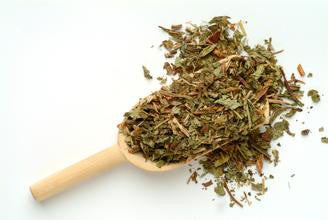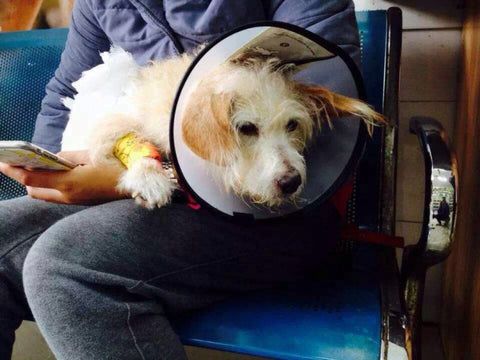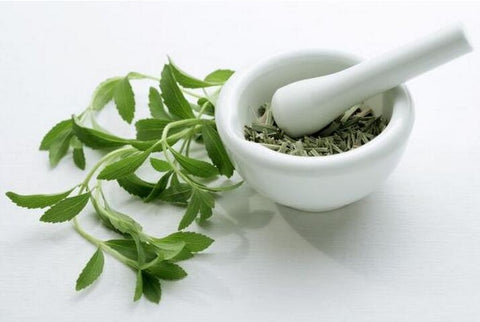
Hemangiopericytoma In Dogs, How Can I Help After Surgery ?
Share

When you learn that your dog has cancer, the world stops.
You leave the vet's office in shock and disappointment. You are frozen and dazed by the bad news on the drive home. By the time you get home, you are brimming with questions that you wish you had asked before at the clinic. Chances are you turned to Google and started your search for additional resources and ended up here. Here’s a brief look at some of the most common concerns you may have if your dog has a bleeding cancer such as hemangiopericytoma.
What is hemangiopericytoma?
Hemangiopericytoma is a type of cancer that grows tumors in the blood vessels. In four out of five cases, the cancer does not spread from the initial site but roots deeply and continues to grow, which can be both a good and bad thing. It most often affects middle-aged or older dogs. Golden Retrievers and German Shepherds are more prone to this type of cancer than other breeds due to hereditary factors.
What are the symptoms of hemangiopericytoma?
Often there are no signs until late stage disease when tumors begin to erupt and the dog is bleeding internally. The spleen is the most frequently affected organ, along with the heart, liver and skin. A spleen tumor can involve significant blood loss and signs of shock such as labored breathing, sudden weakness, and pale gums. Therefore it is always important to keep a schedule of regular checkups for your loved pet.
Can it be cured?
There is no cure for cancer, but dogs occasionally go into remission and survive for years with healthy lives. We cannot say they are cured, but they respond to treatment. Because it is often at a late stage when it is discovered, the survival rate for this type of cancer is not high. Often we do not know why a dog does or does not go into and stay in remission. Fortunately, this type of tumor has a high treatment success rate if it does not occur in the chest, close to the lungs or heart, but it must be diagnosed early before it becomes unmanageable. As with most dog cases, this type of cancer occurs more with large breeds of dogs..
Why don’t they treat it like human cancer?
Cancer is treated differently in animals than it is in humans. The goal with animals is not longevity at any cost. The goal is to keep your pet comfortable and free of pain for as long as possible. Your vet will help you learn what options are reasonable for your dog’s treatment and survival. Pets are treated with mostly quality of life treatments.
What treatment is available?
Depending on many factors unique to your dog’s situation, your vet may recommend aggressive surgery or even amputation. In some cases, radiation therapy may be advised. Treatment may also include a combination of both above options. Often your vet will recommend no treatment at all, especially if your dog is older. This is because the treatment itself may be traumatic and even harmful to your dog. Even if the treatment works there is a high chance of the cancer returning. Bringing your pet back to the vet to follow up after treatment is paramount. Re-occurrence may happen and it's best to find out at the earliest stages so you can make the appropriate decision for your pet that is recommended by the vet.
What about natural treatments?
Many vets recommend boosting your dog’s natural ability to fight disease with homeopathic treatments and restorative nutrition. Dr. Patricia Jordan combines detoxing with Chinese herbs, acupuncture, and vitamin injections and may advise herbal chemotherapy products such as Neoplasene, made of bloodroot extract, or Essiac, made of burdock root, slippery root, slippery elm inner bark, sheep sorrel and Indian rhubarb root. Dr. Jodie Gruenstern proposes radical diet change to starve the cancer and Yunnan Baiyao, a Chinese herbal treatment to slow down internal bleeding.

How does Yunnan Baiyao work?
Yunnan baiyao is a proprietary medicine that has been shown to slow down bleeding. It activates the body's platelets and helps form blood clots. It was discovered more than 100 years ago and is considered by many to be as powerful in Chinese medicine as penicillin is in Western medicine. Yunnan baiyao contains yam roots, ox gall bladder, pseudoginseng, sweet geranium, but the exact recipe is a carefully guarded secret in China
How much Yunnan Baiyao does my dog need?
Like with many herbal and natural treatments, the recommended dosage varies widely. The Modern Herb Shop recommends giving your dog one 250-mg capsule once a day. For best results, split each capsule into two doses of one-half capsule each, to be given at separate times during the day. Do not give continuously. Give it on alternating days, or a repeating 5-day on, 5-day off cycle.
What else can I do?
You are now the primary advocate for your dog’s healthcare. Open up the lines of communication with your vet. Be sure to keep the vet in the loop with any new developments and updates about ongoing concerns. Work together with your vet to create your dog’s treatment plan. Recognize that you will probably feel emotional. You might want to schedule healthy coping activities for yourself, such as exercise, meditation, and spending time with loved ones.
Sometimes your affection can greatly increase the benefits of all treatments and recuperation, so do not leave your pet alone for a prolonged period of time and remember to monitor all medications (especially painkillers) prescribe to your pet. Careful observation of pet medication is important because there are many medication overdose accidents that can be avoided.
